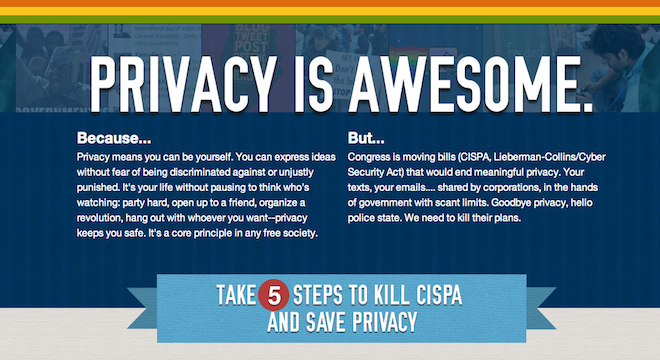Fearing that the U.S. Senate will soon vote to pass a cybersecurity bill that could erode Web user privacy, a prominent Internet freedom advocacy group has launched a new online campaign to get the American public to confront Senators face-to-face during their weeklong Memorial Day recess at the end of the month.
Fight For the Future, a nonprofit advocacy group that in late 2011 helped launch the successful massive online protest against the much-hated anti-online bill known as SOPA (the Stop Online Piracy Act), is turning to some of the same tactics that helped kill that bill.
Only this time, the group is targeting two Senate bills that contain language similar to CISPA (the Cyber Information Sharing and Protection Act), a controversial bill passed by the House of Representatives in a rushed vote in April.
CISPA would allow private companies and the government to share Web users’ personal information, with the goal of repelling and defending against cyber attacks.
“The problem is these [Senate] bills contain language identical to CISPA,” said Donny Shaw, a campaign organizer with Fight For the Future, in a phone interview with TPM.
On Wednesday, Fight For the Future launched a new webpage, “Privacy Is Awesome,” giving Web users a five step guide to pestering their Senators over the phone and via email, with the goal of pressuring the lawmakers into scheduling face-to-face meetings with voters during their upcoming recess, which extends through the week of May 28.
Specifically, Fight For the Future wants voters to complain to Senators about the two CISPA-like bills.
“We think the best strategy is for people to meet with Senators while they are at home on recess and tell them the public’s position on these bills,” Shaw told TPM,
One of the bills, the Cybersecurity Act of 2012, co-sponsored by Sens. Joe Lieberman (I-CT) and Susan Collins (R-ME), has the tentative support of the Obama Administration and could be put to a full Senate vote sometime in early June.
The other Senate bill Fight For the Future opposes, the SECURE IT Act, sponsored by Sen. John McCain (R-AZ), is currently stuck in a Senate committee, which it has to clear before being able to get a full Senate floor vote, so it’s not as pertinent.
Fight For the Future’s major problem with CISPA, SECURE IT and the Cybersecurity Act of 2012 are that all three bills contain language that would allow the government and private companies to share the personal information they’ve collected about Web users with each other, “notwithstanding any other provision of law,” essentially exempting them from current laws restricting how much Web data they can collect in share, and in what instances.
“These provisions would basically waive all existing privacy laws and give corporations legal immunity for sharing information with the government,” Shaw said.
Indeed, a close reading of the bills by TPM reveals that, much like in the case of CISPA, the bills do not contain language specifying what information could be collected and shared and what avenue users or others would have for finding out about government use of their data, nor is there clear legal recourse for users who believe their information was shared improperly.
That said, the Cybersecurity Act of 2012 does contain language stating that “nothing in this title may be construed to limit liability for a failure to comply,” with requirements in the bill that all those government agencies and companies that share information “make reasonable efforts…to safeguard information that can be used to identify specific persons…”
The backers of all the bills, as well as Senate Majority Leader Harry Reid, have all stated that cybersecurity legislation allowing this type of information sharing between corporations and the government is necessary to protecting U.S. companies and Web users from hacks, malware and other types of cyber attacks.
However, Fight for the Future won’t say whether it thinks that cybersecurity bills are necessary to stop such attacks.
“We aren’t taking a position on that,” Shaw said. “This isn’t an issue of cybersecurity [for us], its an issue of fundamental rights, offline or online.”
In order to become a law, any of the bills have to pass both the House and the Senate. But CISPA itself hasn’t been introduced to the Senate, so if the Senate voted to pass either of the other two bills, they would need to go back to the House and be voted on again. Then, if a bill passed both houses, the president would still need to sign it. The Obama Administration threatened to veto CISPA but has indicated it will support the Cybersecurity Act of 2012.






